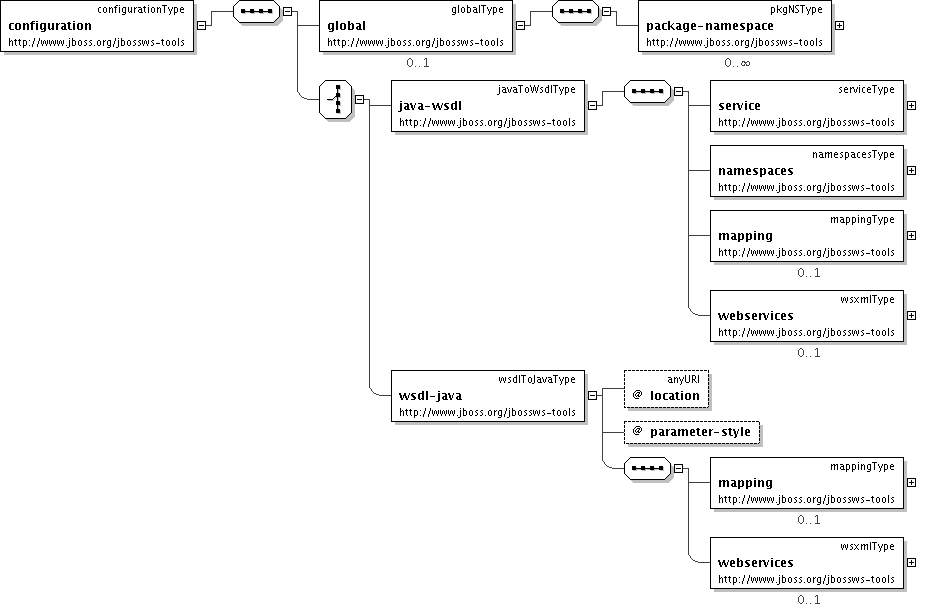
| Target Namespace | http://www.jboss.org/jbossws-tools |
|---|---|
| Element and Attribute Namespaces |
|
| Prefix | Namespace |
|---|---|
| ns1 | http://www.jboss.org/jbossws-tools |
| xml | http://www.w3.org/XML/1998/namespace |
| xs | http://www.w3.org/2001/XMLSchema |
| Name | configuration |
|---|---|
| Type | ns1:configurationType |
| Nillable | no |
| Abstract | no |
| Documentation | Configuration Element |

'Generates a WSDL file from a JSR-109 service endpoint interface. Additionally, a webservices.xml and a JSR-109 mapping file can also be generated'
'Generates a JSR-109 service endpoint interface, and optionally a JSR-109 mapping file'

| Super-types: | None |
|---|---|
| Sub-types: | None |
| Name | configurationType |
|---|---|
| Used by (from the same schema document) | Element configuration |
| Abstract | no |
'Generates a WSDL file from a JSR-109 service endpoint interface. Additionally, a webservices.xml and a JSR-109 mapping file can also be generated'
'Generates a JSR-109 service endpoint interface, and optionally a JSR-109 mapping file'

| Super-types: | None |
|---|---|
| Sub-types: | None |
| Name | globalType |
|---|---|
| Used by (from the same schema document) | Complex Type configurationType |
| Abstract | no |

| Super-types: | None |
|---|---|
| Sub-types: | None |
| Name | javaToWsdlType |
|---|---|
| Used by (from the same schema document) | Complex Type configurationType |
| Abstract | no |
'Namespaces to use when generating the WSDL file.'
'Specifies the JSR-109 mapping file to generate.'
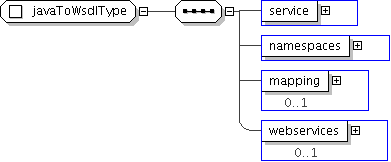
| Super-types: | None |
|---|---|
| Sub-types: | None |
| Name | mappingType |
|---|---|
| Used by (from the same schema document) | Complex Type javaToWsdlType , Complex Type wsdlToJavaType |
| Abstract | no |

| Super-types: | None |
|---|---|
| Sub-types: | None |
| Name | namespacesType |
|---|---|
| Used by (from the same schema document) | Complex Type javaToWsdlType |
| Abstract | no |
'The target namespace of the WSDL. By default, it will be derived from the package name of the java endpoint.'
"'The namespace to be used for the schema types.By default, will be the same as the target namespace of the WSDL file.'
"/>
| Super-types: | None |
|---|---|
| Sub-types: | None |
| Name | operationType |
|---|---|
| Used by (from the same schema document) | Complex Type serviceType |
| Abstract | no |
'The Java method name.'
"'If true, the generated WSDL operation should have no response message.'
"'The name of the return value in the response message.'
">'Represents a method parameter. It must be in the exact order of the Java method signature.'
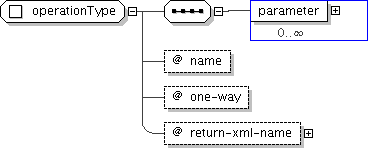
| Super-types: | None |
|---|---|
| Sub-types: | None |
| Name | parameterType |
|---|---|
| Used by (from the same schema document) | Complex Type operationType |
| Abstract | no |
'The fully qualified Java class name of the method parameter type.'
"'Used to customize the name of the parameter that is used in the generated WSDL file.'
"'Indicates the in/out mode of the parameter. The \"IN\" mode is a normal java parameter. The \"OUT\" mode is a holder parameter that is used to pass multiple return values. The \"INOUT\" mode is a holder parameter that is used to receive as well as return values. The default is \"IN\".'
"'Indicates whether this parameter should be mapped to a SOAP header instead of a SOAP body part.'
"/>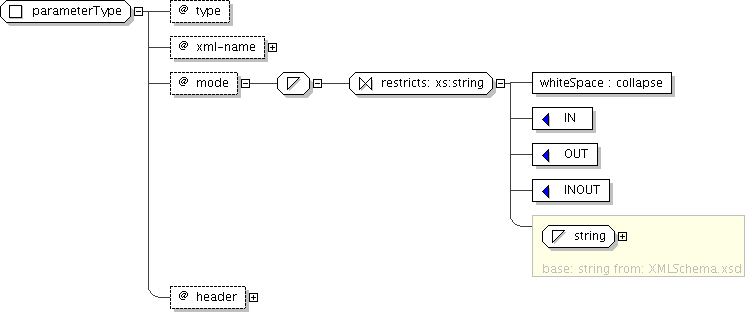
| Super-types: | xs:string < pkgNSType (by extension) |
|---|---|
| Sub-types: | None |
| Name | pkgNSType |
|---|---|
| Used by (from the same schema document) | Complex Type globalType |
| Abstract | no |
| Documentation | A package namespace pair. |

| Super-types: | None |
|---|---|
| Sub-types: | None |
| Name | serviceType |
|---|---|
| Used by (from the same schema document) | Complex Type javaToWsdlType |
| Abstract | no |
'Name of the service. This will appear in the service element of the generated WSDL file.'
"'The fully qualified Java interface name of the service endpoint interface.'
"'The style of the web service. The \"rpc\" style indicates multiple parts where each part is a separate schema document instance. The \"document\" style indicates that the body of the message is represented by a single part.'
"'The parameter style convention to use when using document/literal. The \"bare\" convention requires that the Java method have a single parameter that represents the full request message body, and a single return value that represents the full response message body. The \"wrapped\" convention allows any Java method signature because it wraps all parameter in a single schema type.'
">'Used to customize a WSDL operation. This chlid elements of this tag are mapped to a Java method on the endpoint interface. The name and parameter types must be specified in order to locate the method.'
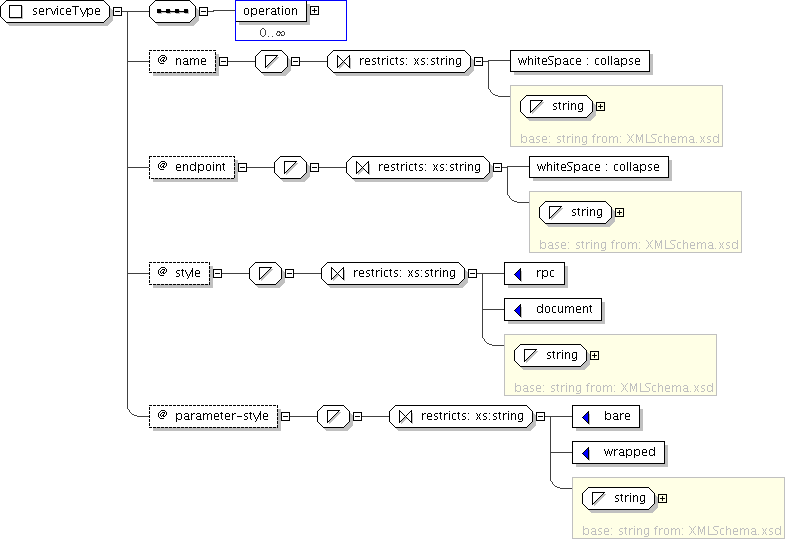
| Super-types: | None |
|---|---|
| Sub-types: | None |
| Name | wsdlToJavaType |
|---|---|
| Used by (from the same schema document) | Complex Type configurationType |
| Abstract | no |
'Specifies the location of the WSDL file as a URL. The URL may be either absolute or relative to the current directory. Remote protocols such as http are supported.'
"'The parameter style convention to use when using document/literal. The \"bare\" convention requires that the Java method have a single parameter that represents the full request message body, and a single return value that represents the full response message body. The \"wrapped\" convention allows any Java method signature because it wraps all parameter in a single schema type.'
">'Specifies the JSR-109 mapping file to generate.'
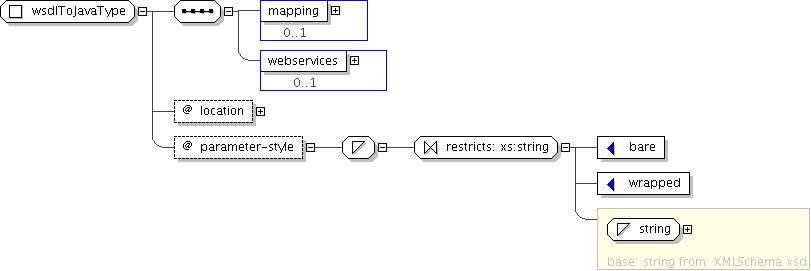
| Super-types: | None |
|---|---|
| Sub-types: | None |
| Name | wsxmlType |
|---|---|
| Used by (from the same schema document) | Complex Type javaToWsdlType , Complex Type wsdlToJavaType |
| Abstract | no |
'Specifies the web.xml servlet-link that is used by Java Service Endpoints (WAR style deployments)'
"'Specifies the ejb-jar.xml ejb-link for Stateless Session Bean endpoints'
"
| Super-types: | Address < AusAddress (by extension) |
|---|---|
| Sub-types: |
|
| Name | AusAddress |
|---|---|
| Abstract | no |
The XML Instance Representation table above shows the schema component's content as an XML instance.
Abstract (Applies to complex type definitions and element declarations). An abstract element or complex type cannot used to validate an element instance. If there is a reference to an abstract element, only element declarations that can substitute the abstract element can be used to validate the instance. For references to abstract type definitions, only derived types can be used.
All Model Group Child elements can be provided in any order in instances. See: http://www.w3.org/TR/xmlschema-1/#element-all.
Choice Model Group Only one from the list of child elements and model groups can be provided in instances. See: http://www.w3.org/TR/xmlschema-1/#element-choice.
Collapse Whitespace Policy Replace tab, line feed, and carriage return characters with space character (Unicode character 32). Then, collapse contiguous sequences of space characters into single space character, and remove leading and trailing space characters.
Disallowed Substitutions
(Applies to element declarations). If substitution is specified, then substitution group members cannot be used in place of the given element declaration to validate element instances. If derivation methods, e.g. extension, restriction, are specified, then the given element declaration will not validate element instances that have types derived from the element declaration's type using the specified derivation methods. Normally, element instances can override their declaration's type by specifying an xsi:type attribute.
Key Constraint Like Uniqueness Constraint, but additionally requires that the specified value(s) must be provided. See: http://www.w3.org/TR/xmlschema-1/#cIdentity-constraint_Definitions.
Key Reference Constraint Ensures that the specified value(s) must match value(s) from a Key Constraint or Uniqueness Constraint. See: http://www.w3.org/TR/xmlschema-1/#cIdentity-constraint_Definitions.
Model Group Groups together element content, specifying the order in which the element content can occur and the number of times the group of element content may be repeated. See: http://www.w3.org/TR/xmlschema-1/#Model_Groups.
Nillable
(Applies to element declarations). If an element declaration is nillable, instances can use the xsi:nil attribute. The xsi:nil attribute is the boolean attribute, nil, from the http://www.w3.org/2001/XMLSchema-instance namespace. If an element instance has an xsi:nil attribute set to true, it can be left empty, even though its element declaration may have required content.
Notation A notation is used to identify the format of a piece of data. Values of elements and attributes that are of type, NOTATION, must come from the names of declared notations. See: http://www.w3.org/TR/xmlschema-1/#cNotation_Declarations.
Preserve Whitespace Policy Preserve whitespaces exactly as they appear in instances.
Prohibited Derivations (Applies to type definitions). Derivation methods that cannot be used to create sub-types from a given type definition.
Prohibited Substitutions (Applies to complex type definitions). Prevents sub-types that have been derived using the specified derivation methods from validating element instances in place of the given type definition.
Replace Whitespace Policy Replace tab, line feed, and carriage return characters with space character (Unicode character 32).
Sequence Model Group Child elements and model groups must be provided in the specified order in instances. See: http://www.w3.org/TR/xmlschema-1/#element-sequence.
Substitution Group Elements that are members of a substitution group can be used wherever the head element of the substitution group is referenced.
Substitution Group Exclusions (Applies to element declarations). Prohibits element declarations from nominating themselves as being able to substitute a given element declaration, if they have types that are derived from the original element's type using the specified derivation methods.
Target Namespace The target namespace identifies the namespace that components in this schema belongs to. If no target namespace is provided, then the schema components do not belong to any namespace.
Uniqueness Constraint Ensures uniqueness of an element/attribute value, or a combination of values, within a specified scope. See: http://www.w3.org/TR/xmlschema-1/#cIdentity-constraint_Definitions.